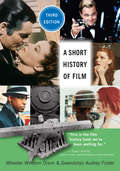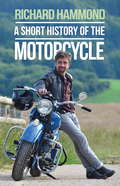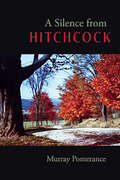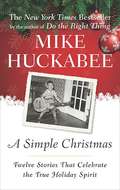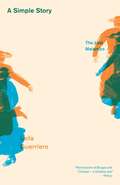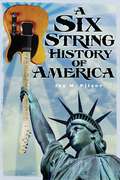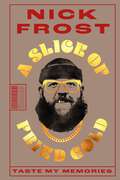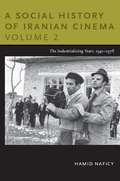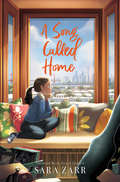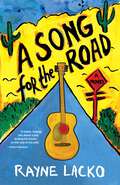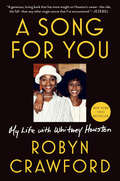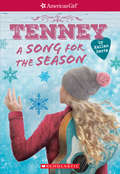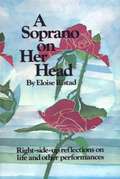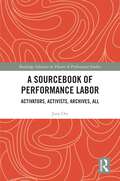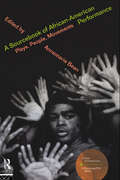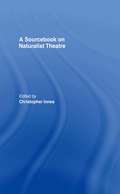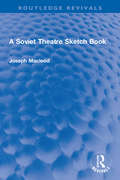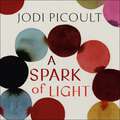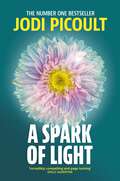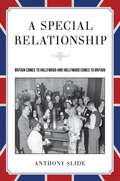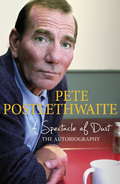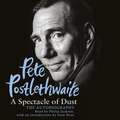- Table View
- List View
A Short History of Film, Third Edition
by Wheeler Winston Dixon Gwendolyn Audrey FosterWith more than 250 images, new information on international cinema—especially Polish, Chinese, Russian, Canadian, and Iranian filmmakers—an expanded section on African-American filmmakers, updated discussions of new works by major American directors, and a new section on the rise of comic book movies and computer generated special effects, this is the most up to date resource for film history courses in the twenty-first century.
A Short History of Music (Fourth American Edition, Revised)
by Alfred EinsteinThis book covers considers such topics as: primitive music--what was it? how do we know anything about it? music of the middle ages, music of the renaissance, instrumental music through the ages, opera--Latin America is included in this discussion, chamber music--did you know it was popular in the 1920s? Though sometimes technical, this volume is easy to read.
A Short History of the Motorcycle
by Richard HammondIt's cold, wet and dangerous, so why do we do it? Richard Hammond's A SHORT HISTORY OF THE MOTORCYCLE attempts to explain what it is about bikes and biking that calls to some people, leaving them powerless to resist. This entertaining guide charts the history of the bike from its origins as a cheap and modest means of transport for the masses to its modern incarnations: a terrifying symbol of rebellion and menace, a high-tech racing machine and the rich kid's plaything. We look at the bikes that have propelled people across the world to work, to school and to their doom.As for the bikers ... Edwardian ladies did it, though not in large numbers. Young bucks desperate to prove their manhood did it, because it was the cheapest speed available. Hammond examines bikers of every type, from the happy farmer trundling through fields on their Honda Cub to the Hell's Angel terrorising Californian towns on their hog.Wittily written and lavishly illustrated, A SHORT HISTORY OF THE MOTORCYCLE is a thrilling ride for bikers and non-bikers alike.
A Silence from Hitchcock
by Murray PomeranceIn A Silence from Hitchcock, Murray Pomerance explores the resonating power of silence in the director's work—its variation, its haunting temptation, and its technical power. Working from a meditative devotion to and an illuminating familiarity with the director's work, Pomerance shines light upon six films, some of them (Notorious, The Lady Vanishes, and The Trouble with Harry) frequently, even obsessively treated, and others (Frenzy, The Wrong Man, and Topaz) less often discussed. In its strange relation to speech, memory, urbanity, guilt, mortality, and espionage, silence becomes, in these films, a dramatic protagonist in its own right. Written by a master interpreter of Hitchcock, this book offers new ways of seeing, experiencing, and thinking about the films of one of cinema's greatest artists, as well as new ways of reflecting on our experience of cinema itself.
A Simple Christmas: Twelve Stories That Celebrate the True Holiday Spirit
by Mike HuckabeeThe first Christmas was a simple one. So simple that it had all the makings of a first-class disaster. It's a miracle it turned out well at all. In fact, that's the whole point. It really remains, a miracle - the greatest miracle of all time.
A Simple Story: The Last Malambo
by Leila Guerriero Frances RiddleObsession and mastery in their purest states: the story of one dancer’s attempt to win the biggest contest of his life. Every year, at the height of summer, the remote Argentine village of Laborde holds the national malambo contest. Centuries-old, this shatteringly demanding traditional gaucho dance is governed by the most rigid rules. And this festival has one stipulation that makes it unique: the malambo is danced for up to five minutes. That may seem like nothing, but consider the world record for the hundred-meter dash is 9.58 seconds. The dance contest is an obsession for countless young men, who sacrifice their bodies and money as they strive to become the champion, knowing that if they win—in order to safeguard the title’s prestige—they can never compete again. When Leila Guerriero traveled to Laborde, one dancer’s performance took her breath away, and she spent a year following him as he prepared for the next festival. The result is this superlative piece of journalism, told with tremendous economy and power.
A Six String History of America
by Jay M. PilzerDrawing on his years of experience as a history professor and longtime guitar dealer, author Jay Pilzer leads us on an entertaining and thoughtful journey through the fascinating, diverse, and sometimes wild history of the guitar in America. Viewed through the broad scope of the American experience, this retrospective cleverly melds together such unexpected guitar-related subjects as the Tulip Mania of 1636, the swaying hips of hula girls in Hawaii, and what really powered Jimi Hendrix's Stratocaster at Woodstock. Our author ponders all aspects of guitar history, including:- How the period of the Enlightenment was an influence on guitars- Why the economics of the 1600s were a prelude to guitar prices of the twenty-first century- The surprising influences on guitar designs and styles- How the advent of American steamboats and railroads helped guitar sales- The development of blues and jazz, and the types of instruments used for each style- The affects of installment buying on guitar sales after the Great Depression- How and why guitar quality declined in the 1970s and why guitar executives cringed at the sound of disco in the 1980sThese, and many other aspects of guitar history, are covered in this fully-readable and enjoyable book. Whether you play or listen, this romp through the history of guitars will truly entertain!
A Slice of Fried Gold
by Nick FrostHow the Joy of Cooking Saved MeFollow comedic actor Nick Frost’s journey with family recipes that reconnect him to memories and loved ones from long ago.A cookbook of laughs, tears, and stroganoff. Known for comedy movies such as Shaun of the Dead and Hot Fuzz, Nick Frost has touched the hearts of millions throughout his career. Now, he shares his culinary side in an all-new celebrity memoir that mixes humorous advice with honest truths. A Slice of Fried Gold is a love letter to cooking, the people who inspired him, and how his emotional connection to food has impacted his life and relationships. Full of delicious recipes, familiar faces, and touching moments from Nick’s life, discover how cooking can create bonds that last a lifetime.Make every meal a memory. When twelve-year-old Nick first recreated his mom’s beef stroganoff, he found that it brought out a version of her that he only saw when she was sober: pride. Now, years after her death, he continues to make it so he and his family can still know her and her best moments with every bite. With many other memories about how the joy of cooking helped him cope with the loss and chaos in his life, Nick’s story will inspire you to find your own uplifting way of reconnecting with loved ones and your happiest moments with them.Inside A Slice of Fried Gold, you’ll also discover:15+ meaningful recipes and how Nick Frost adds his own techniques to each mealHow cooking has helped with his ADHDHis experience of sharing his famous Pie in a Bowl with friend and co-star Simon PeggWays to cherish memories and traditions with the next generationIf you liked celebrity cookbooks such as Snoop Dog Presents Goon with the Spoon, Pie is Messy, or How to Cook That, you’ll love A Slice of Fried Gold.
A Social History of Iranian Cinema: The Industrializing Years, 1941-1978
by Hamid NaficyHamid Naficy is one of the world's leading authorities on Iranian film, and A Social History of Iranian Cinema is his magnum opus. Covering the late nineteenth century to the early twenty-first and addressing documentaries, popular genres, and art films, it explains Iran's peculiar cinematic production modes, as well as the role of cinema and media in shaping modernity and a modern national identity in Iran. This comprehensive social history unfolds across four volumes, each of which can be appreciated on its own. Volume 2 spans the period of Mohammad Reza Shah's rule, from 1941 until 1978. During this time Iranian cinema flourished and became industrialized, at its height producing more than ninety films each year. The state was instrumental in building the infrastructures of the cinema and television industries, and it instituted a vast apparatus of censorship and patronage. During the Second World War the Allied powers competed to control the movies shown in Iran. In the following decades, two distinct indigenous cinemas emerged. The more popular, traditional, and commercial filmfarsi movies included tough-guy films and the "stewpot" genre of melodrama, with plots reflecting the rapid changes in Iranian society. The new-wave cinema was a smaller but more influential cinema of dissent, made mostly by foreign-trained filmmakers and modernist writers opposed to the regime. Ironically, the state both funded and censored much of the new-wave cinema, which grew bolder in its criticism as state authoritarianism consolidated. A vital documentary cinema also developed in the prerevolutionary era. A Social History of Iranian CinemaVolume 1: The Artisanal Era, 1897-1941 Volume 2: The Industrializing Years, 1941-1978 Volume 3: The Islamicate Period, 1978-1984 Volume 4: The Globalizing Era, 1984-2010
A Song Called Home
by Sara ZarrFrom award-winning author Sara Zarr comes a story of the small moments that show us who we are, and how family is not just something you’re part of, but something you make.Lou and her family don’t have much, but for Lou it's enough. Mom. Her sister, Casey. Their apartment in the city. Her best friend, Beth. It would be better if Dad could stop drinking and be there for her and Casey, and if they didn't have to worry about money all the time. But Lou doesn’t need better—she only needs enough.What’s enough for Lou, however, is not enough for Mom. Steve, Mom's boyfriend, isn’t a bad guy, he's just…not what Lou is used to. And now, he and Mom are getting married, and that means moving. Packing up life as they’ve known it and storing it in Steve’s garage. Lou will be separated from everything in her small but predictable life, farther from Dad than ever.Their last night in the city, Lou receives a mysterious birthday gift: A guitar, left for her by their front door. There’s nothing saying who left it, but it must be from Dad. And as she leaves the only place she’s ever known, she starts to believe that if she can learn how to play it, maybe she can bring a piece of him, and of her old life, home.
A Song For the Road: A Novel
by Rayne LackoWhen a tornado destroys his Tulsa home, fifteen-year-old Carter Danforth is trapped in the pawnshop where his father hawked his custom, left-handed Martin guitar six years earlier before taking off, leaving him with nothing but a hankering to pluck strings and enough heartache to sing the blues. Carter’s mother, meanwhile, is injured during the storm and winds up in the hospital. She wants Carter to fly out to Reno and stay with her sister, but he’s already spent her hidden cash stash to buy his dad’s guitar. Rather than tell her the truth, he embarks on an epic road trip in search of his father in California. But Carter isn’t a runaway. He reckons he’s a “running to.”On the road, Carter picks up licks, chord changes, and performance techniques from a quirky cast of southwestern charmers: a rock star, a thief, a bluesman, a chanteuse-turned-chef, and the dream of a girl back home. By the time he reaches the end of old US Route 66, Carter has learned how to deep-fry yucca blossoms—and tell the truth of his life through music.
A Song for You: My Life with Whitney Houston
by Robyn CrawfordAfter decades of silence, Robyn Crawford, close friend, collaborator, and confidante of Whitney Houston, shares her story. Whitney Houston is as big a superstar as the music business has ever known. She exploded on the scene in 1985 with her debut album and spent the next two decades dominating the charts and capturing the hearts of fans around the world. One person was there by her side through it all—her best friend, Robyn Crawford. <P><P>Since Whitney’s death in 2012, Robyn has stayed out of the limelight and held the great joys, wild adventures, and hard truths of her life with Whitney close to her heart. Now, for the first time ever, Crawford opens up in her new memoir, A Song for You. With warmth, candor, and an impressive recall of detail, Robyn describes the two meeting as teenagers in the 1980s, and how their lives and friendship evolved as Whitney recorded her first album and Robyn pursued her promising Division I basketball career. <P><P>Together during countless sold-out world tours, behind the scenes as hit after hit was recorded, through Whitney’s marriage and the birth of her daughter, the two navigated often challenging families, great loves, and painful losses, always supporting each other with laughter and friendship. <P><P>Deeply personal and heartfelt, A Song for You is the vital, honest, and previously untold story that provides an understanding of the complex life of Whitney Houston. Finally, the person who knew her best sets the record straight. <P><b>A New York Times Bestseller</b>
A Song for the Season (American Girl: Tenney Grant #4)
by Kellen HertzBuckle your seatbelts--In this fourth book in the series, Tenney & Logan are taking their show on the road! Christmas is just around the corner, and Tenney can't wait to share their music with fans all over Tennessee. But being on the road is harder than she expected--she's missing out on her favorite holiday traditions at home. . . and why is Logan being such a scrooge? After a series of disappointments, the duo begins to crack under pressure. Can they save the tour--and their holiday spirit--in time for Christmas?
A Soprano on Her Head: Right-side-up Reflections on Life and Other Performances
by Eloise RistadIn a playful and experimental way, Eloise Ristad encourages her students to learn a lot about themselves in unconventional ways. New approaches to sight-reading and learning rhythms, and even reading sheet music, delight her students. Students find that they have clearer minds as they confront their "inner judges" and turn them into advisors. And you too, can do the same.
A Sound Move
by Linda MontoyaEddie Hernandez and his band have been invited to play in a festival. One member refuses to practice. Will the band be ready in time?
A Sourcebook of Performance Labor: Activators, Activists, Archives, All (Routledge Advances in Theatre & Performance Studies)
by Joey OrrA Sourcebook of Performance Labor presents the views and experiences of collaborators in other artists’ works. This book reorients well-known works of contemporary performance and social practice around the workers who have shaped, enacted, and supported them. It emerges from perspectives on maintenance, care, affective labor, and the knowledges created and preserved through gesture and intersubjectivity. This compilation of interviews is filled with the voices of collaborators in notable works attributed to established contemporary artists, including Francis Alÿs, Tania Bruguera, Suzanne Lacy, Ernesto Pujol, Asad Raza, Dread Scott, and Tino Sehgal. In the spirit of the artworks under discussion, this book reinvests in the possibilities for art as a collective effort to explore new ways of finding ourselves in others and others in ourselves. The Sourcebook collection is a contribution for further theorizing a largely unaddressed perspective in contemporary art. This collection will be of great interest to students and scholars in performance studies and art history.
A Sourcebook on African-American Performance: Plays, People, Movements (Worlds of Performance)
by Annemarie BeanA Sourcebook on African-American Performance is the first volume to consider African-American performance between and beyond the Black Arts Movement of the 1960s and the New Black Renaissance of the 1990s.As with all titles in the Worlds of Performance series, the Sourcebook consists of classic texts as well as newly commissioned pieces by notable scholars, writers and performers. It includes the plays 'Sally's Rape' by Robbie McCauley and 'The American Play' by Suzan-Lori Parks, and comes complete with a substantial, historical introduction by Annemarie Bean.Articles, essays, manifestos and interviews included cover topics such as:* theatre on the professional, revolutionary and college stages* concert dance* community activism * step shows* performance art.Contributors include Annemarie Bean, Ed Bullins, Barbara Lewis, John O'Neal, Glenda Dickersun, James V. Hatch, Warren Budine Jr. and Eugene Nesmith.
A Sourcebook on Naturalist Theatre
by Christopher InnesA Sourcebook on Naturalist Theatre provides essential primary sources which document one of the key movements in modern theatre. Christopher Innes has selected three writers to exemplify the movement, and six plays in particular: * Henrik Ibsen - A Dolls House and Hedda Gabler * Anton Chekhov - The Seagull and The Cherry Orchard * George Bernard Shaw - Mrs Warren's Profession and Heartbreak House. Innes' introduction provides an overview of naturalist theatre. Key themes include: the representation of women, significant contemporary issues and the links between theory, play writing and stage practice. The primary sources explore many aspects of naturalism, giving information on: * the playwrights' intentions when writing plays * contemporary reviews * literary criticism * political and social background * production notes from early performances of the plays.
A Soviet Theatre Sketch Book (Routledge Revivals)
by Joseph MacleodFirst Published in 1951, A Soviet Theatre Sketch Book presents Joseph Macleod’s take on Russian Theatre in a semi-fictional way to show the effect of the productions upon different audiences. By using his pen as an artist uses his pencil, he gives, for the first time, an account of theatre audiences as composed of individual human beings and is able to paint the scenes vividly without neglecting the technical methods of the Soviet stage. By supple use of the sketch- book form, theatres, theatre-schools, actors, and actresses including some no longer appearing are painted into an all-over view of Russian and Ukrainian post-war life. In this book the author writes less immediately about the Soviet Union and does not depend on topicality or stop press news. Joseph Macleod and his wife visited the Soviet Union as the guests of the Russian and Ukrainian Societies for Cultural Relations with Foreign Countries. This book will be of interest to scholars and researchers of theatre, history of theatre, and performance studies.
A Spark of Light: THE NUMBER ONE SUNDAY TIMES BESTSELLER
by Jodi PicoultTHE #1 SUNDAY TIMES BESTSELLER 'A writer the world needs to be reading right now' The Independent'An apposite and nuanced novel... Picoult writes about an emotive, controversial issue with unflinching precision.' Red'A very special novel about a very difficult subject.' Grazia****The Center for women's reproductive health offers a last chance at hope - but nobody ends up there by choice.Its very existence is controversial, and to the demonstrators who barricade the building every day, the service it offers is no different from legalised murder.Now life and death decisions are being made horrifyingly real: a lone protester with a gun has taken the staff, patients and visitors hostage.Starting at the tensest moment in the negotiations for their release, A Spark of Light unravels backwards, revealing hour by urgent hour what brought each of these people - the gunman, the negotiator, the doctors, nurses and women who have come to them for treatment - to this point.And certainties unwind as truths and secrets are peeled away, revealing the complexity of balancing the right to life with the right to choose.(P)2018 Hodder & Stoughton Limited
A Spark of Light: THE NUMBER ONE SUNDAY TIMES BESTSELLER
by Jodi PicoultTHE #1 SUNDAY TIMES BESTSELLER 'A writer the world needs to be reading right now' The Independent'An apposite and nuanced novel... Picoult writes about an emotive, controversial issue with unflinching precision.' Red'Incredibly compelling and page turning' Dolly Alderton'A very special novel about a very difficult subject.' Grazia'Her intelligent, meticulously researched novels explore ethical dilemmas through heartrending, headline-grabbing scenarios' The Sunday TimesA lone gunman takes the women and doctors at a controversial abortion clinic hostage. Nobody has ended up there by choice.As the tense negotiation for their release unfolds, hour by crucial hour, back in time through the day that brought the hostages and their captor to this moment, every certainty is questioned, every judgement thrown into sharp relief.Because matters of life and death look very different when you, or the ones you love, are staring down the barrel of a gun . . .Powerful, thought-provoking and deeply involving, Jodi Picoult's new novel is told in reverse, propelling the reader through intertwining characters and uncovering motives in this unflinching exploration of what makes a life.THE BOOK OF TWO WAYS, Jodi's stunning new novel about life, death and missed opportunities is available to pre-order now.
A Special Relationship: Britain Comes to Hollywood and Hollywood Comes to Britain
by Anthony SlideA Special Relationship provides not only a historical overview of the British in Hollywood, but also a detailed study of the contributions made by American individuals and companies to British cinema from the beginning of the twentieth century onwards. The story begins with Ohio-born Charles Urban who came to London in 1898 and deserves credit for major involvement in the creation of a British film industry. While Ireland was still a part of Britain, the New York-based Kalem Company made films there from 1910 to 1913. British producers realized the importance of American stars, and many actors, beginning with Florence Turner (who was arguably also the first American star), made numerous British films. In the 1920s, such Hollywood stars as Mae Marsh, Betty Blythe, and Dorothy Gish remained active in Britain. In the 1930s, as their careers came to a halt, more than one hundred former American stars made the trip to England, partly as a vacation and partly in the hope of reenergizing their careers.Chapters discuss American cinematographers at work in Britain in the 1920s and 1930s and the introduction of Technicolor to British films. Diversity is represented by African American performers (most notably Paul Robeson), the Chinese American star Anna May Wong, along with female filmmakers from Hollywood. With Britain's declaration of war on Germany, there were Americans who stayed, such as Bebe Daniels and Ben Lyon, contributing to the war effort. America became actively involved in British cinema after World War II, with many Hollywood studios producing films there. As the years progressed, the British film industry became an international film industry. The book concludes with the Harry Potter and James Bond series, indicative of a new international cinema, with financing and behind-the-camera talent coming from the United States, but with British locales and British stars.
A Spectacle of Dust: The Autobiography
by Pete Postlethwaite Sean BeanVibrant and candid memoirs of the late, great British character actor, Pete Postlethwaite. After training as a teacher, Pete Postlethwaite started his acting career at the Liverpool Everyman Theatre where his colleagues included Bill Nighy, Jonathan Pryce, Antony Sher and Julie Walters. After routine early appearances in small parts for television programmes such as THE PROFESSIONALS, Postlethwaite's first success came with the acclaimed British film DISTANT VOICES, STILL LIVES in 1988. He then received an Academy Award nomination for his role in THE NAME OF THE FATHER in 1993. His performance as the mysterious lawyer "Kobayashi" in THE USUAL SUSPECTS is well-known, and he appeared in many successful films including ALIEN 3, BRASSED OFF, THE SHIPPING NEWS, THE CONSTANT GARDENER, as Friar Lawrence in Baz Luhrmann's ROMEO + JULIET, and in INCEPTION with Leonardo diCaprio. Pete Postlethwaite was one of the best-loved and widely admired performers on stage, TV (SHARPE, THE SINS) and in cinema. In THE ART OF DISCWORLD, Terry Pratchett said that he had always imagined Sam Vimes as 'a younger, slightly bulkier version of Pete Postlethwaite', while Steven Spielberg called him 'the best actor in the world', about which Postlethwaite said: 'I'm sure what Spielberg actually said was, "the thing about Pete is that he thinks he's the best actor in the world."' This is the story of a diverse and multi-talented actor's eventful life, told in his own candid and vibrant words.
A Spectacle of Dust: The Autobiography
by Pete PostlethwaiteVibrant and candid memoirs of the late, great British character actor, Pete Postlethwaite.After training as a teacher, Pete Postlethwaite started his acting career at the Liverpool Everyman Theatre where his colleagues included Bill Nighy, Jonathan Pryce, Antony Sher and Julie Walters. After routine early appearances in small parts for television programmes such as THE PROFESSIONALS, Postlethwaite's first success came with the acclaimed British film DISTANT VOICES, STILL LIVES in 1988. He then received an Academy Award nomination for his role in THE NAME OF THE FATHER in 1993. His performance as the mysterious lawyer "Kobayashi" in THE USUAL SUSPECTS is well-known, and he appeared in many successful films including ALIEN 3, BRASSED OFF, THE SHIPPING NEWS, THE CONSTANT GARDENER, as Friar Lawrence in Baz Luhrmann's ROMEO + JULIET, and in INCEPTION with Leonardo diCaprio. Pete Postlethwaite was one of the best-loved and widely admired performers on stage, TV (SHARPE, THE SINS) and in cinema. In THE ART OF DISCWORLD, Terry Pratchett said that he had always imagined Sam Vimes as 'a younger, slightly bulkier version of Pete Postlethwaite', while Steven Spielberg called him 'the best actor in the world', about which Postlethwaite said: 'I'm sure what Spielberg actually said was, "the thing about Pete is that he thinks he's the best actor in the world."' This is the story of a diverse and multi-talented actor's eventful life, told in his own candid and vibrant words.
A Spectacle of Dust: The Autobiography
by Pete PostlethwaiteAfter training as a teacher, Pete Postlethwaite started his acting career at the Liverpool Everyman Theatre where his colleagues included Bill Nighy, Jonathan Pryce, Antony Sher and Julie Walters. After routine early appearances in small parts for television programmes such as THE PROFESSIONALS, Postlethwaite's first success came with the acclaimed British film DISTANT VOICES, STILL LIVES in 1988. He then received an Academy Award nomination for his role in THE NAME OF THE FATHER in 1993. His performance as the mysterious lawyer "Kobayashi" in THE USUAL SUSPECTS is well-known, and he appeared in many successful films including ALIEN 3, BRASSED OFF, THE SHIPPING NEWS, THE CONSTANT GARDENER, as Friar Lawrence in Baz Luhrmann's ROMEO + JULIET, and in INCEPTION with Leonardo diCaprio. Pete Postlethwaite was one of the best-loved and widely admired performers on stage, TV (SHARPE, THE SINS) and in cinema. In THE ART OF DISCWORLD, Terry Pratchett said that he had always imagined Sam Vimes as 'a younger, slightly bulkier version of Pete Postlethwaite', while Steven Spielberg called him 'the best actor in the world', about which Postlethwaite said: 'I'm sure what Spielberg actually said was, "the thing about Pete is that he thinks he's the best actor in the world."' This is the story of a diverse and multi-talented actor's eventful life, told in his own candid and vibrant words.Read by Philip Jackson (BRASSED OFF), with an introduction by Sean Bean.(p) 2011 Orion Publishing Group
